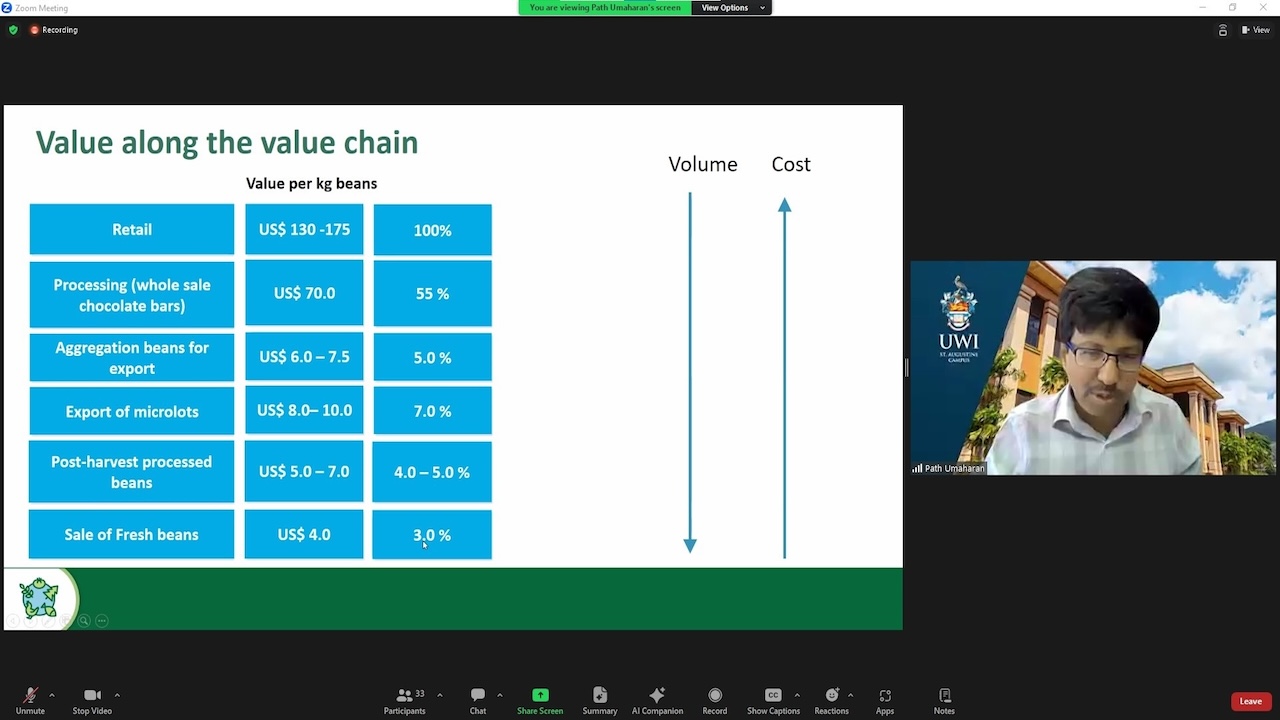News
Stakeholders discuss the sustainable development of cocoa value chain in Trinidad and Tobago
Experts suggest coordinated actions engaging government, academia, the private sector for a sustainable cocoa value chain in the country

Participants at the meeting.
©FAO
20 December 2023, Port of Spain – Representatives from government, academia, development organizations, farmers, traders, and exporters from Trinidad and Tobago, as well as eight other countries across Latin America and the Caribbean, gathered virtually on December 20 to discuss progress and priorities for the cocoa sector in Trinidad and Tobago. The national annual meeting on the implementation of the One Country One Priority Product (OCOP) Initiative was organized by the Food and Agriculture Organization of the United Nations (FAO) and the Ministry of Agriculture, Land and Fisheries (MALF), Cocoa Development Company of Trinidad and Tobago Limited (CDCTTL), and Cocoa Research Centre University of the West Indies (CRC-UWI).
The meeting focused on assessing progress made in country’s cocoa sector, with discussions centered around challenges, opportunities, and the formulation of an action plan for the sector under the OCOP initiative.
Highlights of the meeting
The virtual event, moderated by Mr. Suresh Sookbir, Programme Coordinator at FAO, started with welcome remarks from Ms. Miriam Aertker, FAO Representative (ai) in Trinidad and Tobago, and Mr. Farook Hosein, Permanent Secretary of Agriculture. Both speakers highlighted the importance of the OCOP initiative and called for support to promote the cocoa sector under the initiative.
Ms. Karen Lee Lum, National OCOP Coordinator, FAO, presented the key achievements and outputs of the OCOP initiative in Trinidad and Tobago from 2021 to 2023. These achievements included the implementation of the OCOP project “Innovative approaches for better plant production” funded by Flexible Voluntary Contribution, organization of numerous events and public expos to promote the cocoa sector, a situational analysis on the cocoa sector including recommendations and an action plan for the sector.
Mr. Pathmanathan Umaharan, Professor at the CRC-UWI, was congratulated for receiving the highest honour in Trinidad and Tobago, the Order of the Republic of Trinidad and Tobago presented by the President of the country, for his outstanding work as a geneticist and invaluable contribution to the cocoa industry. Prof. Umaharan discussed strategies and initiatives for developing a sustainable value chain tailored to Trinidad and Tobago's cocoa industry. His presentation provided an overview of the cocoa industry, suggesting sustainable land usage, increased production, and enhancing the capacities of stakeholders across the value chain. He emphasized the importance of addressing the four identified gaps, i.e. Productivity, Land area expansion, Value addition, and Environmental sustainability.

Mr. Pathmanathan Umaharan, Professor at CRC, sharing insights into the cocoa value chain. ©FAO
Researchers from CRC-UWI, Mr. Marvin Lewis and Ms. Anaika Fernandez, shared success stories in optimizing small farm management for cocoa, highlighting effective practices and their impact on productivity and quality. They also spoke on the research findings on optimizing small farm management, discussing the risks faced by the industry in six cocoa agro-ecological zones suggesting recommendations for overcoming these risks through proper planning, integrated agricultural practices, precision farming, and climate-smart agriculture techniques.
Mrs. Mala Partap, CEO (Ag) of CDCTTL, discussed her organization's role in providing operational support for optimizing small farm processes and quality control. She emphasized CDCTTL's commitment to strengthening market access and mentoring farmers in producing and marketing high-quality cocoa beans at local and international levels.
Mr. Asif Khan, Technical Advisor for the BIOREACH Project of the Environment Management Authority, shared how the BIOREACH project is supporting the cocoa sector by promoting sustainable land use, biodiversity, and green practices in synergies with the OCOP initiative.
Ms. Janelle Joe, Assistant FAO Representative (Programme) in Trinidad and Tobago and Suriname, presented the FAO Sub-Regional Cocoa Project 'Strengthening the foundations for a specialty cocoa sector in the Caribbean 2023-2025’. She highlighted the project goal of supporting the Dominican Republic, Grenada, St. Lucia, Trinidad and Tobago in positioning Caribbean fine-flavor cocoa in global markets and increasing the incomes of cocoa producers and processors by engaging governments and the private sector.
In his concluding remarks, Mr. Ian Mohammed, Director of Research at MALF, stressed the significance of collective efforts in promoting the development of the cocoa sector under the OCOP initiative.
Next steps for the cocoa sector
The event generated crucial recommendations and next steps for the sector, emphasizing coordinated actions engaging government, academia, the private sector, and other stakeholders. The formulation and implementation of a national OCOP work plan for 2024–26 emerged as a pivotal strategy for nurturing a sustainable cocoa value chain, engaging all relevant actors.
The collaborative efforts among the government, FAO, and various stakeholders and on-the-ground activities exemplify Trinidad and Tobago’s commitment to maximizing the potential of the cocoa sector. The OCOP initiative is poised to generate employment, uplift rural communities, and contribute to the country's overall economic progress.
The OCOP initiative is a globally recognized initiative of FAO that aims to enhance rural economies by promoting the development and marketing of special agricultural products (SAPS) with unique characteristics and potential to be promoted in the regional and international markets. By identifying SAPs, the OCOP facilitates capacity development, infrastructure improvement, and market access.
- One Country One Priority Product (OCOP) website
- FAO Director-General showcases OCOP Initiative as powerful catalyst for change
- Video on OCOP initiative
- A dynamic FAO Regional Launch and Workshop on the Implementation of OCOP Country Projects was held in Trinidad and Tobago
- FAO OCOP Regional Organizing Group for Latin America and the Caribbean
